
Oil Prices Ease on Concerns Over Recession
Oil prices fell in early trade on Tuesday as concerns about a probable recession and reduced consumption overshadowed expectations of limited global supply and increased fuel demand in China after Beijing’s stimulus promises.
Brent crude futures for July were down 35 cents, or 0.3 per cent, at $113.07 a barrel as of 0122 GMT. WTI crude futures in the United States fell 36 cents, or 0.3 per cent, to $109.93 per barrel. Earlier in the session, both benchmarks fell by more than $1. Brent rose 0.7 per cent on Monday, while WTI was practically flat.
Multiple dangers to the global economy topped the list of concerns among the world’s wealthy at the annual Davos economic summit, with some predicting a global recession. Kristalina Georgieva, Managing Director of the International Monetary Fund, stated that she does not expect a recession in major nations but cannot rule one out. Investors were selling because they expected higher oil costs to reduce global fuel usage.
Optimism Provides Support
However, lingering concerns about global supply and optimism for Chinese demand recovery provided some support.
According to the head of Saudi Aramco, the world is facing an oil supply shortage, with most corporations hesitant to invest in the industry due to green energy constraints, who added that the company could not grow production capacity as quickly as promised.
The world’s largest oil importer, China, would expand tax credit rebates, postpone social security payments and loan repayments, launch new investment projects, and take other measures to assist the economy, state television reported on Monday.
Shanghai, China’s business powerhouse, aims to return to normalcy on June 1 as coronavirus caseloads fall. However, growing new Covid-19 cases in Beijing have sparked fears about future restrictions.
Meanwhile, the European Union is expected to impose a ban on Russian oil imports “within days,” according to Germany. Moscow stated that it sees economic ties with China expanding after being ostracized by the West over its invasion of Ukraine.

Russia’s biggest oil company has slashed.
Rosneft, Russia’s largest oil business, has reduced output since the invasion of Ukraine began.
In mid-May, the company’s output was 560,000 barrels per day lower than in February.
Rosneft was producing roughly 3.8 million barrels per day in February. Still, that figure had dropped to 3.24 million by this month.
Overall, Russian oil output was 830,000 barrels per day lower, with Rosneft accounting for almost two-thirds of the decrease.
The European Union is currently attempting to agree on an import embargo before the end of the year. However, many continents’ enterprises have been “self-sanctioning” by avoiding Russian energy.
Exxon Mobil, a major US oil corporation, has exited Russia, including the massive Sakhalin-1 project, which includes Rosneft. Sakhalin-1 production fell by more than 145,000 barrels per day between February and mid-May.
Rosneft and other corporations raised output in May. Hence, there are indications that Russian manufacturers are becoming accustomed to the limits. According to analysts, India has been a significant importer of Russian oil, now trading at a discount.
Since the war, Russia is still making much money from energy sales; sanctions and drops in oil production give it constant income, thanks to increased oil prices.
The country’s current account surplus — the difference between the value of its exports and imports — increased to $96 billion in the first four months of the year; although, it had rather a dramatic drop in imports.




